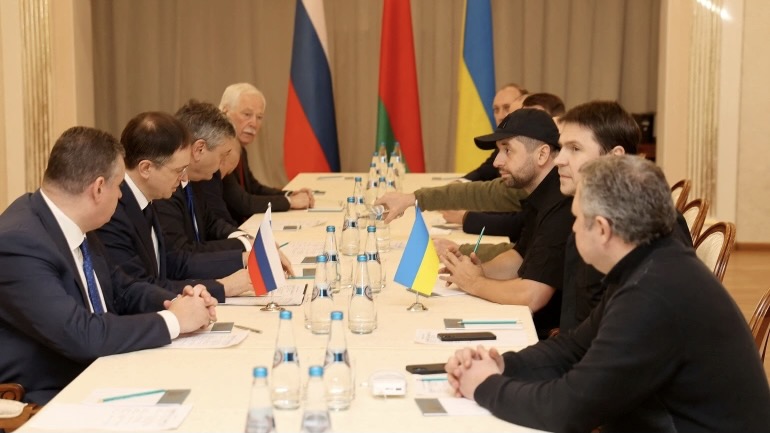In a major development crucial for peace in the ongoing war between Ukraine and Russia, both the parties started negotiations in Gomel in Belarus, near the Ukrainian and Russian, borders on Monday, February 28. The delegates of the two countries reached Gomel early after initial hiccups regarding the venue of the talks.
A Russian delegation consisting of “representatives of foreign ministry, the defense ministry and other agencies, including the presidential administration” arrived to Belarus according to Kremlin spokesperson Dmitry Preskov, Russian news agency TASS reported.
Ukraine claimed it is seeking immediate ceasefire and withdrawal of Russian troops in the talks. Ukrainian President Volodymyr Zelensky in a phone conversation with UK prime minister Boris Johnson claimed that the next 24 hours are crucial for the war.
Various countries like China and Iran have welcomed the announcement of direct talks between Ukraine and Russia and called them necessary for peace.
Zelensky was also reported as saying that he does not expect much from the negotiations. He claimed that he had a phone conversation with the president of the European Commission, Ursula von dor Leyen, and talked about EU membership for Ukraine.
On Sunday February 27, several countries announced fresh sanctions on Russia, including Singapore and South Korea. Some countries, including the US and Japan, confirmed that they are working to exclude major Russian banks from the SWIFT banking system. The European Union (EU) announced shutting down its airspace for Russian flights.
The EU also announced EUR 500 million support to Ukraine for buying weapons and other equipment. The EU said that it was the first time that it was banning Russian news channels Russia Today (RT) and Sputnik, calling them “Kremlin media machines”. Leyen announced that “we are developing tools to ban their toxic harmful disinformation in Europe”.
The EU’s move to ban RT and Sputnik invited fierce criticism from journalists and activists across the world, who called it an assault on free speech and a sign of Europe’s double speak on press freedom.
“The European Union has announced it will ban Russian-state backed television channels RT and Sputnik" A further indication of pseudo character of "free speech" in the West – shows West can't reply to RT's arguments, otherwise why not just leave it on air? https://t.co/aXEVv5pfEX
— John Ross (@JohnRoss43) February 27, 2022
The UK claimed on Monday that it was able to supply arms to Ukraine following the announcement of Russian aggression. It also announced a ban on all transactions with Russia’s Central Bank on Monday. The Russian Central Bank was forced to double the interest rate to 20% in order to face the impact of international bans on the Russian economy.
Safe passage to civilians
Meanwhile, Russia criticized Ukrainian authorities handing down weapons to civilians and offered a safe corridor to civilians who want to leave Kiev peacefully on Monday. The Russian ministry of defense claimed that it is only attacking military objects and civilian populations are not at risk.
The situation of Kiev is not clear as its Mayor Vitali Klitschko on Sunday retracted his own statement claiming that Russian troops have surrounded the city. Several western media reports claimed that Russian forces are around 30 kilometers away from the capital city.
According to the United Nations, as of February 26, 240 casualties had taken place so far in Ukraine since Russian President Vladimir Putin announced “special military operations” inside Ukraine early on Thursday. Putin claimed the operation was in response to the failure of the Ukrainian government to implement the Minsk agreement and violations of rights of the Russian speaking population in the Donbass region.
The Russian Ministry of Defense admitted on Sunday that there were casualties among their armed forces in Ukraine but did not specify the numbers. It also acknowledged that some of its troops have been taken hostage by the Ukrainian military and Nationalist forces and accused them of torture. Its spokesperson, Igor Konshenkov on Sunday announced that though the civilians in Ukraine will not be harmed, all leaders of the government in Kiev who have issued calls to torture captured Russian soldiers “in violation of prisoners of war treatment convention will be inevitably punished,” Russian News Agency, TASS reported.
This is a developing story.





